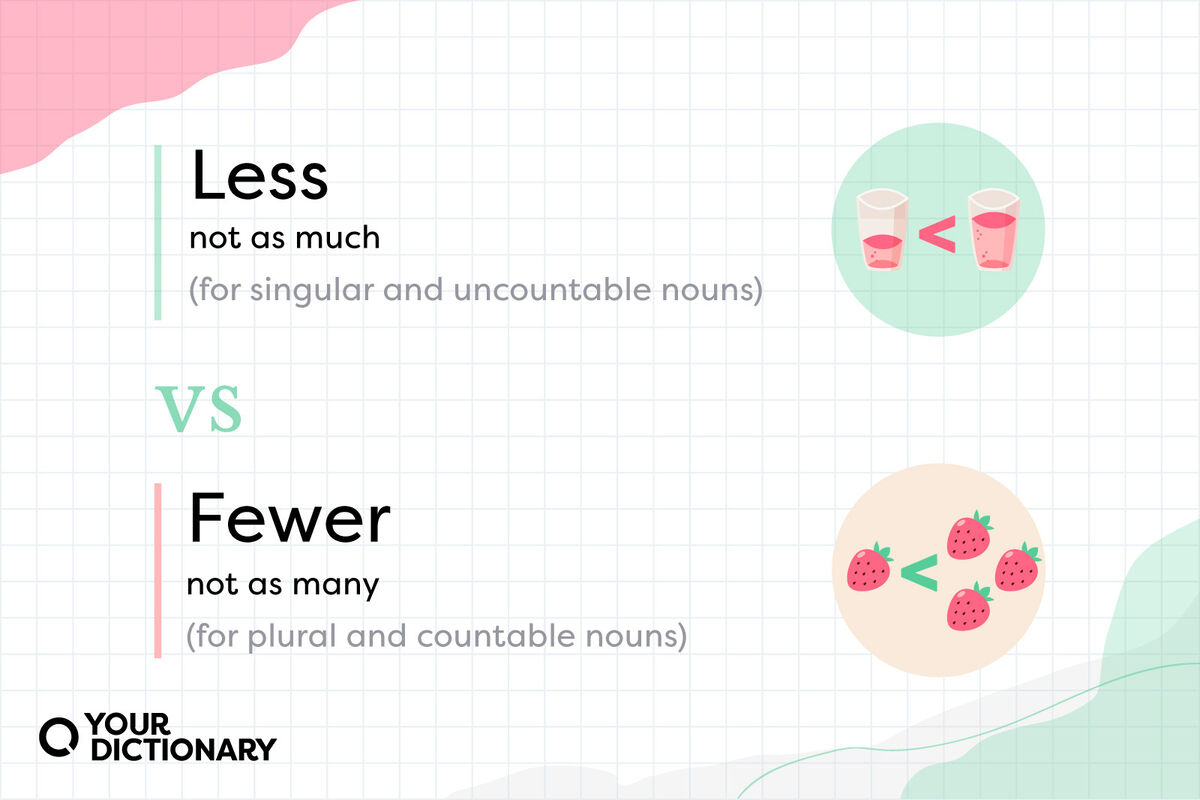
Both less and fewer are determiners that mean “a smaller amount.” But less typically means “not as much” (for uncountable nouns) and fewer refers to “not as many” (for countable nouns). However, there are some exceptions to this rule — and knowing them can help you avoid grammar mistakes in the future.
Use ‘Less’ When Describing Uncountable Amounts
When you’re trying to say “not as much” of a singular or uncountable noun, you want to use the determiner less. For example:
- You should use less sugar in your coffee.
- I have less money than my brother.
- You should have one less problem to solve after today.
- Could you give me a little less rice?
- No, I need a little less butter.
- I need to drink less coffee.
- There is less milk in my glass.
- You should add less oil.
Use ‘Fewer’ When Describing Nouns You Can Count
If the noun you’re describing is a plural noun, meaning that it is a countable noun, use fewer. For example:
- Fewer than ten people bought tickets to the show, so it was canceled.
- I want fewer gifts for my birthday this year and more fun with my friends.
- There are fewer puppies in the pen than last time.
- There were fewer tables available for lunch today.
- There are fewer people here than last time.
- You should buy fewer gifts.
- I saw fewer cars on the street.
- There were fewer jobs this week in the classifieds.
Additional Rules for Less vs. Fewer
It would be nice if the English language were neatly divided into countable and uncountable nouns, but that’s not the case. So should you use less or fewer when describing time and money? What about measurements and percentages?
Time and Money
Time and money can get a bit confusing. Even though you describe the plural word years, you are talking about a singular chunk of time. In this case, you would use less to describe that chunk of time or money. For example:
- She completed her internship in less than three years.
- In less than four years, she'll be back home.
- She made less than ten dollars.
- The tip was less than five dollars for the meal.
- It wasn’t worth it when I made less than four dollars an hour.
But when units of time are expressed in a countable way, use fewer:
- It would be nice to spend fewer minutes cleaning and more reading.
- Fewer hours working and more having fun sounds great.
- I’ll be gone for fewer days than last time.
Weight and Measurement
Though weight can be counted, it would sound funny if you used fewer rather than less. For example, the sentence, "My dog weighs fewer than 90 lbs." doesn't sound quite right. Use less when talking about an amount of weight rather than measuring weight:
- My dog weighs less than 90 lbs.
- You will need less than four gallons of water.
- That was less than five meters in length.
- The baby weighed less than two pounds at birth.
- The truck was less than a ton.
Percentages
If a percentage refers to something uncountable (such as a percentage of water or air), use less. For example:
- You drank less than 5% of your milk.
- You used less than 10% of the water.
- I watched you eat less than 5% of that meat before throwing it away.
- I had heard less than 10% of the news before running to the door.
- The foundation had less than 90% of the money they needed to meet their goal.
However, if it’s a percentage about something countable (such as people or bananas), use fewer:
- Fewer than 5% of people like spam.
- There are fewer than 7% of people wearing red.
- Fewer than 10% of the bin are peaches.
- We counted fewer than 5% of the cantaloupes on the table were ripe.
- Fewer than 40% of the people were let into the club.
Common Fewer vs. Less Errors
Now that you know the rules for less vs. fewer, you may find that this grammar mistake is more common than you once thought. Just stopping by the local grocery store may be a wake-up call, as the express line typically reads “10 Items or Less.”
Based on the singular vs. plural rules, the sign is incorrect because 10 items are clearly countable (there are 10), and it should read “10 Items or Fewer.” While the checkout line may not follow the rules of grammar, you can be sure that you know the difference going forward.